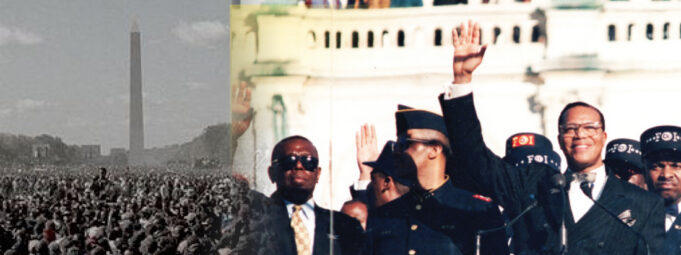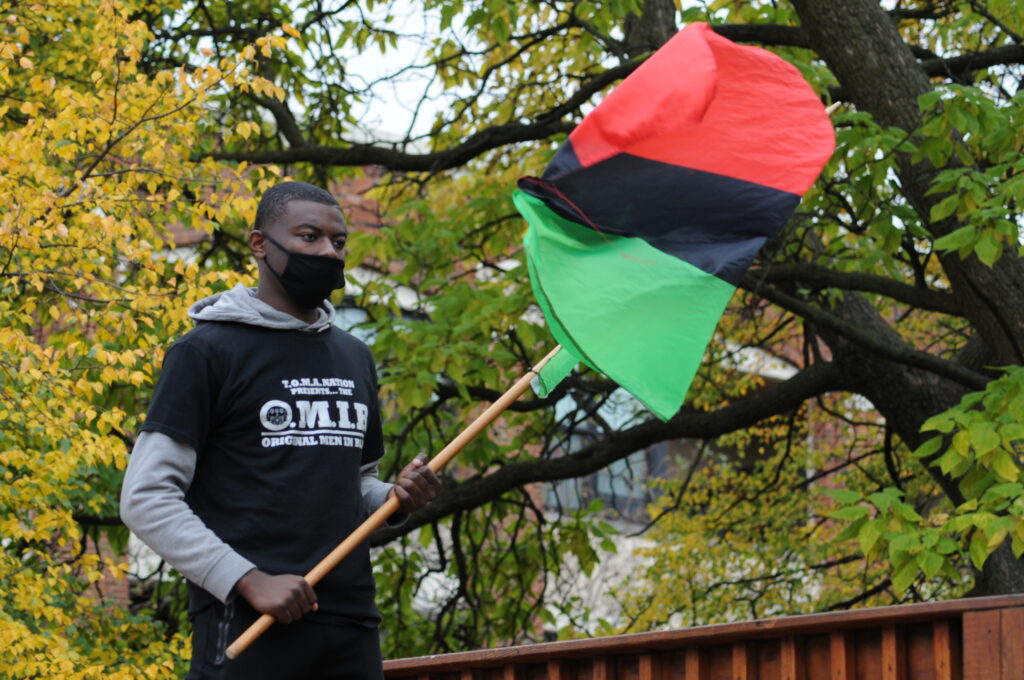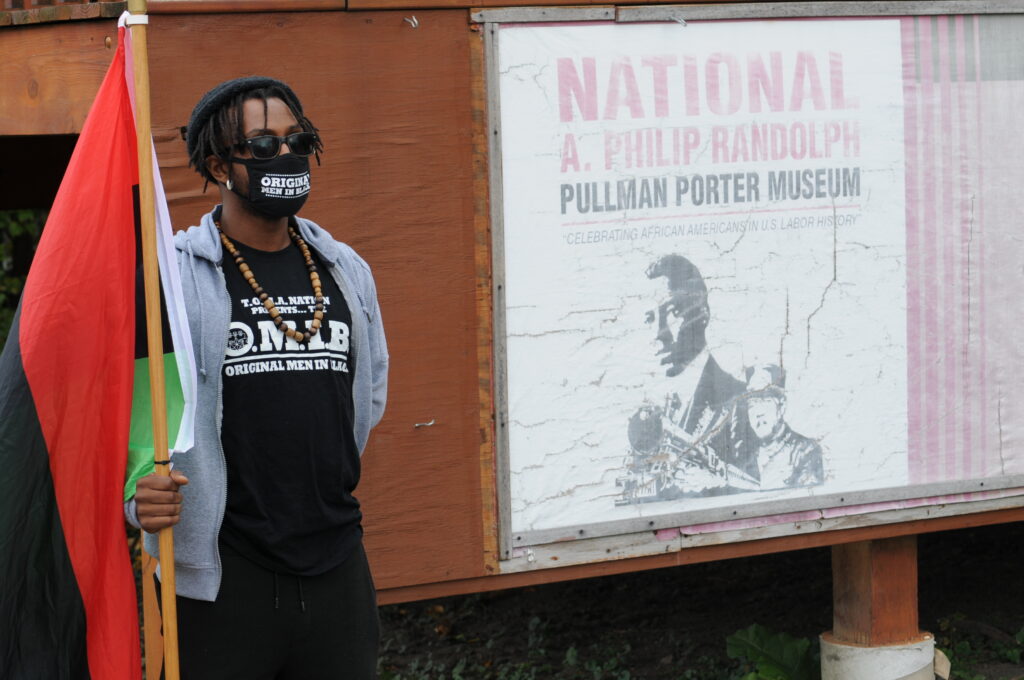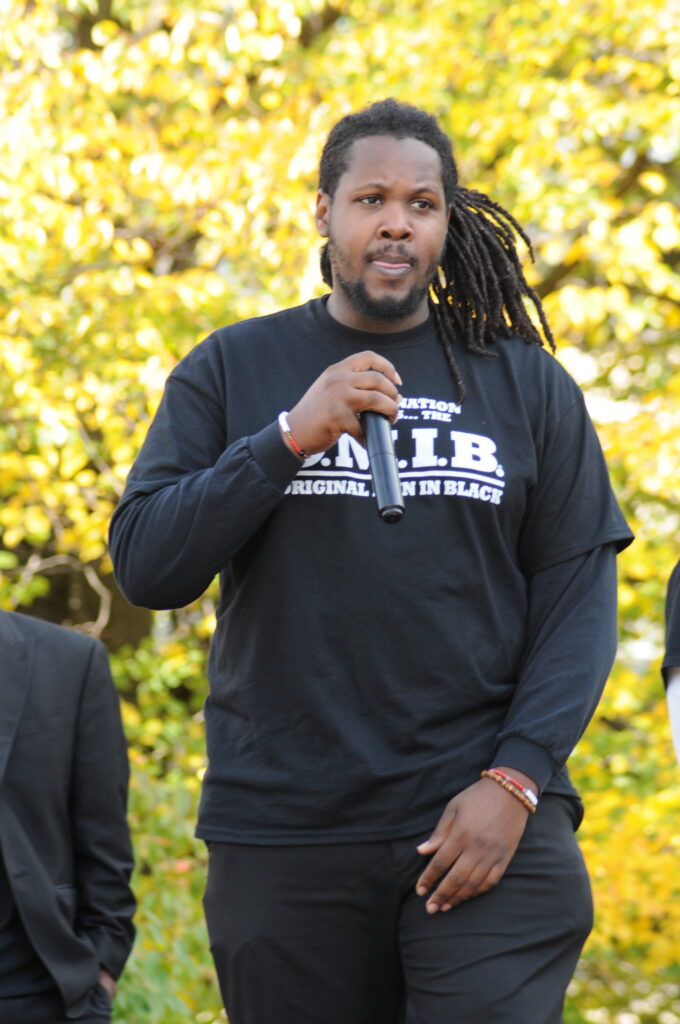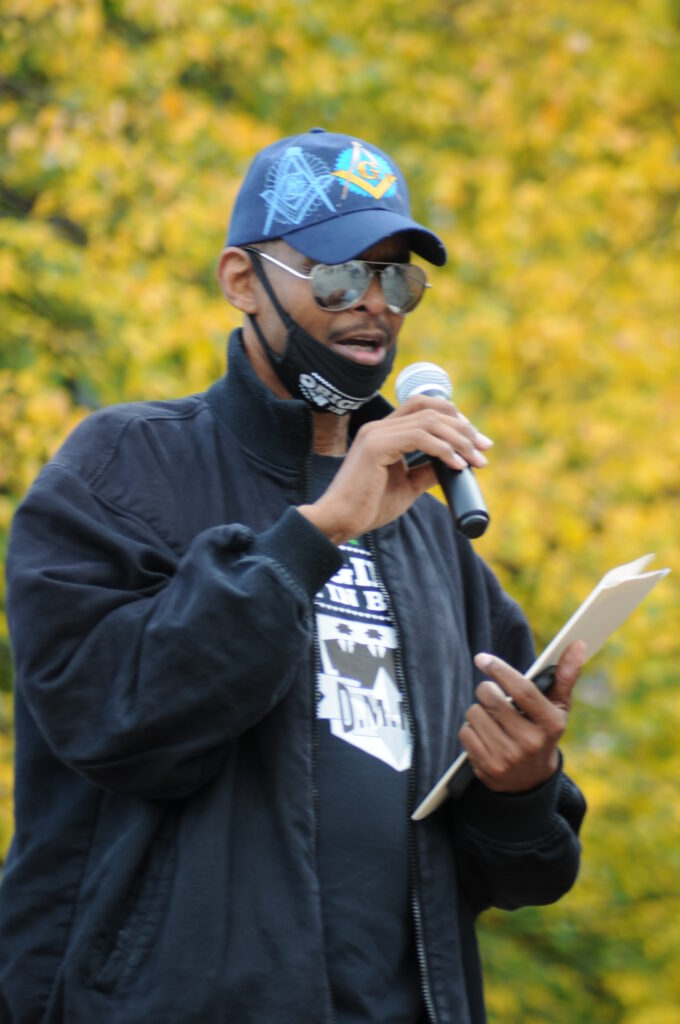Sharing an uplifting word from 1995 Men’s March to do a mighty work in 2020 and beyond
by James G. Muhammad and Toure Muhammad, The Final Call Newspaper
CHICAGO—Celebrations in observance of the 25th anniversary of the 1995 Million Man March culminated at Mosque Maryam with a replaying of the Honorable Minister Louis Farrakhan’s historic speech.
Delivering opening remarks, Student Minister Ishmael Muhammad, the national assistant to Min. Farrakhan, noted the importance that the world knows how the march came about.
Nearly two million men didn’t just pop up out of nowhere, Min. Ishmael Muhammad said Oct. 18.
On that Oct. 16 day in 1995 on the steps of the U.S. Capitol before the largest assembly of Black men in American history, Min. Farrakhan called the men to atonement, reconciliation and responsibility to Allah (God), their families and communities.
It was a day when Congress took the day off, the president left town and the city shut down because forces and the media painted a picture of possible violence, but it became a day when God gave the world a “glimpse of heaven,” Min. Muhammad said.
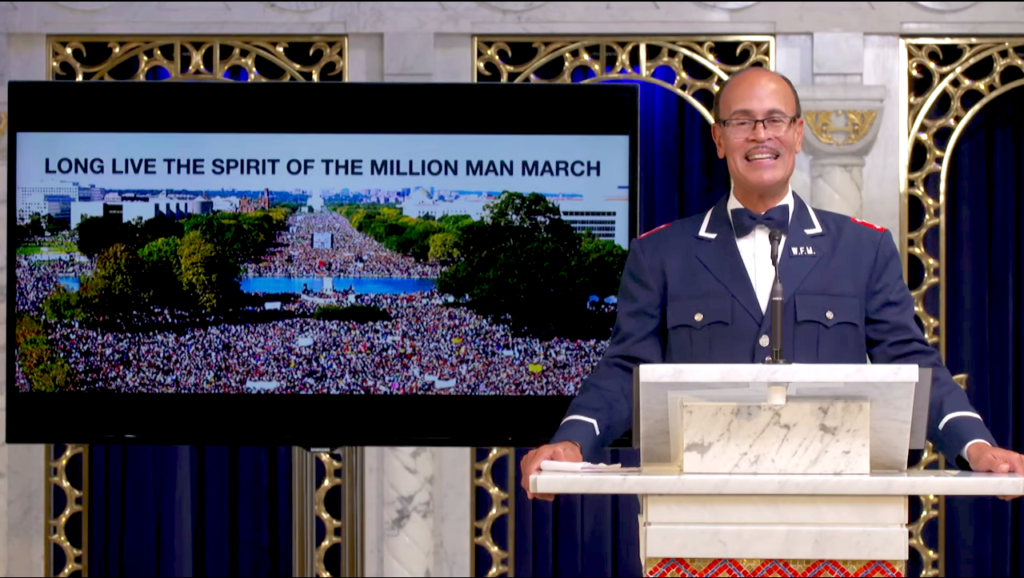
“That day was a sign of what we would do every day in the future,” he said.
Reflecting on that day and at times lifting words from an article written by Min. Farrakhan in The Final Call newspaper, Min. Muhammad said the call for a march was first expressed during a 1994 “Men Only” meeting in New York City.
Speaking to 10,000 men at an armory in Harlem, the Minister said he wanted to take a million men to Washington.
“God gave him those words and he then had to catch up with those words and make it happen,” Min. Muhammad said.
But the seed for the March was planted in 1963 when Min. Farrakhan was with the Honorable Elijah Muhammad watching the March on Washington for Jobs and Justice led by civil rights leaders.
The Hon. Elijah Muhammad said he saw too much frivolity, joking and a picnic atmosphere at the 1963 march and that one day he would call for a serious march on Washington.
That seed would further germinate in Min. Farrakhan’s 1985 vision-like experience as he came to realize that the U.S. planned a war—told to him by the Honorable Elijah Muhammad in that vision-like experience—on two fronts. One was against Islamic nations in the East, the other against Black youth and the Nation of Islam in America.
“No one came to Min. Farrakhan with the idea to march nor to take a million men to Washington, D.C. It was given to him by God through the Honorable Elijah Muhammad,” Min. Muhammad said.
“From that 1994 meeting in New York, the Minister worked every day, spending two to three days in a different city … and he didn’t give 20 minute speeches, they were over two hour meetings along with interviews and meetings with leadership,” Min. Muhammad described.
In addition to the theme of atonement, reconciliation and responsibility, the event called for a “Day of Absence” from work, school and all other non-essential activities.
The day was consecrated as an official “Day of Atonement” by clergy from various faiths during a ceremony at Rankin Chapel on the campus of Howard University. The day would be marked by praying, fasting and petitioning the Creator to hear Black people’s pain, Min. Muhammad said.
Despite its lofty call and goals, the enemies of the rise of Black people intensified their opposition and Min. Farrakhan and the Nation of Islam became its main targets, Min. Muhammad said. It angered those who had the mind of the late FBI Director J. Edgar Hoover to “prevent the rise of a Black messiah,” he said.

Min. Muhammad noted that pastors who had allowed the Minister into their congregations prior to the march were influenced to deny him access after the march to even thank their congregations for their support and participation.
“That day in Washington, D.C., affected the world and that the one the world had been looking for is present,” he said. “The enemy’s aim is to make sure that a day like that never happens again.”
The Minister never got to experience the day because he was in a room in the U.S. Capitol, Min. Muhammad said. And when he came out, he said he “felt like a leaf being blown by the wind … carried by a spirit and power so much bigger than myself,” Min. Muhammad said reading the Minister’s own words.
“Never before did ex-slaves come together in unity as we did at the Million Man March,” he continued said, “The Hon. Elijah Muhammad said the unity of the Black man would give us a weapon more powerful than an atomic or hydrogen bomb.
“Twenty-five years ago that was a bomb that was dropped in D.C. It was a shot heard around the world. The unity of the Black man in America. That day wouldn’t have been possible if it were not for God’s intervention,” he said.
Highlighting the virtual and public celebrations of the anniversary was the broadcast of the March streamed on Von.TV, an online video platform, that is part of WVON-AM 1690 radio, which rebroadcasted the Minister’s speech over Chicago’s airwaves and online.
During a roundtable discussion on WVON-AM radio 1690 simulcast over Von.TV, the radio station’s digital video platform, Final Call editor Naba’a Muhammad, contributing editor James G. Muhammad, staff writer Nisa Islam Muhammad and contributing writer Michael Z. Muhammad talked about the Million Man March and an historic 48-page edition of The Final Call newspaper devoted to the March.
“We don’t just want to reminisce; we want to reignite the spirit of the Million Man March given the challenges we face. We want to look back and take lessons in unity, organizing, self-determination and faith, we need today,” said Naba’a Muhammad, who also talked about the March and the special coverage in The Final Call newspaper earlier in the day on WVON -AM’s Perri Small Show.
The next day, Oct. 16, Von.TV re-broadcast the 1995 Million Man March.
Besides virtual sessions and March rebroadcasts, an outdoor gathering was held at the National A. Philip Randolph Pullman Porter Museum in the city’s Roseland neighborhood.
Organizers and speakers said the Million Man March was still important as a teaching tool and point of inspiration to compel action.
Lionel Muhammad, one of the event organizers, said, “This Holy Day of Atonement means reconciliation and responsibility. Those pledges that we took in 1995, we want to enforce that pledge and make a difference in our community and in our world.”
David Peterson, president and executive director of the National A. Philip Randolph Pullman Porter Museum, was 14 years old in 1995. He attended the Million Man March as a high school freshman.
“The reason that it’s important that we convene here today 25 years later is because it was our obligation and instruction to take what we learned and experienced there and share it with our community,” he said.
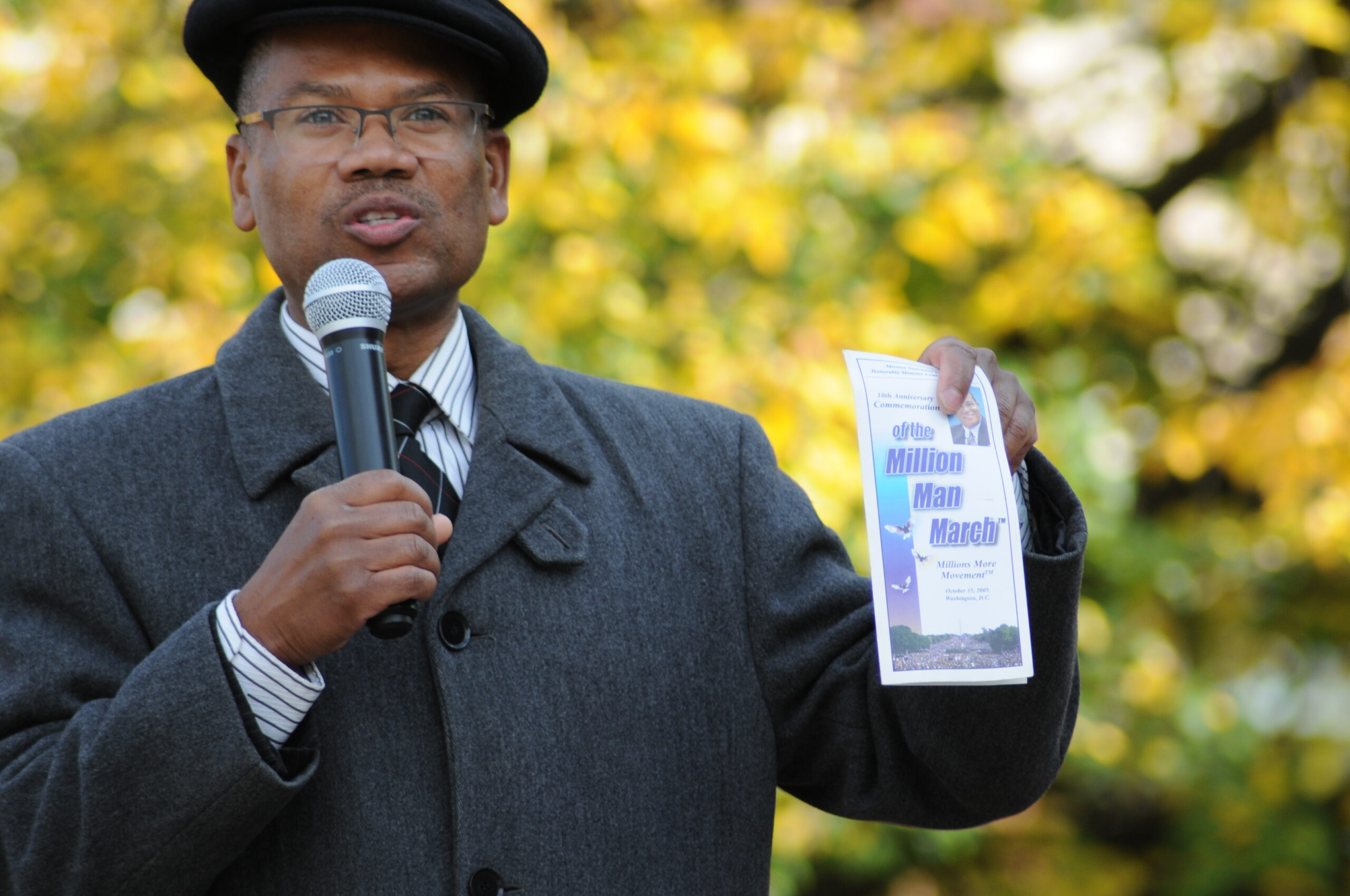
The need to reinvigorate the spirit of the Million Man March lives but needs to be reinvigorated to address today’s social ills, said many men who attended the historic March.
They also renewed the March pledge to improve themselves, protect their women and children and become world builders and community builders.
Several organizations, including the Nation of Islam, Temple of Mercy Association, Big Mama’s Movement, River Jordan Ministry and others gathered in the historic museum to remember the Million Man March and declare their intention to try harder to help unite and uplift the community.
Speakers and participants talked about the need for operational unity among organizations, community activism and the need to work collective economic development “because it was our obligation and instruction to take what we learned and experienced there and share it with our community.”
Along with preserving and uplifting the work of A. Phillip Randolph and the Brotherhood of Sleeping Car Porters, Mr. Peterson shared with attendees how the museum is work space for initiatives, programs and work that will uplift the Pullman-Roseland neighborhood and other neighborhoods throughout the city.
“This is America’s first and only Black labor history museum. This is a place we can take pride in and ownership in. It helps us preserve our heritage, history and culture, but it also gives us a roadmap and blueprint for the next generation moving forward,” he added.
“We can have millions of people standing around just talking but if we don’t take into consideration what the Minister encouraged us to do 25 years ago, we are disrespecting his vision,” the museum leader continued.
“We heard from the Minister that day and he had us recite the pledge. And I’ve been teaching that pledge to generation and generation ever since that day,” said Minster Rahim Aton, founder of the Temple of Mercy Association. He was 37 years old in 1995.
“We look at the Holy Day of Atonement as a Black holiday. The Temple of Mercy is an all-inclusive, Black conscious organization that works to unite the Black community regardless of religion and economic status for the good of the Black community,” he said.
Youth Minister Taharka J. Shakur of Temple of Mercy was not quite two years old when the Million Man March was held. He’s also one of the young men Min. Aton has shared the March mission and vision with.
“I’ve read the (Million Man March) mission statement and more specifically, the pledge that the men stated,” said Min. Shakur. He said he saw the power of the man who made the call, Minister Farrakhan, and commended the men who attended and took the pledge.
But as a millennial, he expressed some disappointment in the men who attended. “There were some men there who may have dropped the ball. The men who were there who are now 25 years older. Many of them may not have adhered to that call. We can see the way our communities look today. The crime and violence in our community would not be where it is now if the men who attended had stayed the course,” he said.
Just as Black women were a strong voice at the Million Man March, a strong Black woman gave a special message to the men. “Brothers, we need you to love on one another,” said Pastor Victoria Brady, president and CEO of ABJ Community Services and leader of Big Mama’s Movement. She urged Black men to come together in unity to stop the killing of Black youth.
“We care about our children, our babies. … This is an appeal to our brothers. We need you to do everything you can to stand united. The Big Mama Movement Chicago, we stand ready to support our brothers, our sisters and anybody that is going to do something about a 10 year old being shot in the back (Oct. 7). … Where is the march for that 10-year-old girl that is fighting for her life?”












